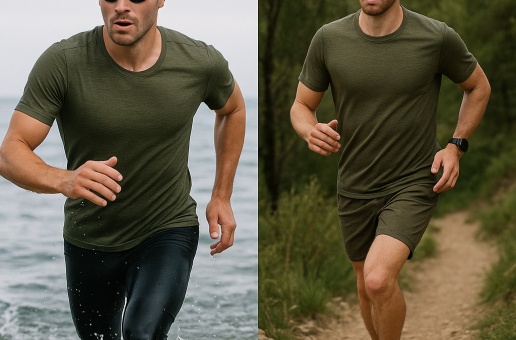Enhance Comfort and Performance with Natural Fiber Clothing
Par Sarah Publié le 06/10/2025 à 20h00 Temps de lecture : 3 minutes Crédit Image: AI Generated
Crédit Image: AI Generated
Natural Fiber Clothing: A Game Changer for Endurance Athletes
As endurance athletes, whether you're a triathlete, trail runner, swimmer, cyclist, or hiker, the importance of comfortable and high-performance clothing cannot be overstated. Clothing made from natural fibers is gaining popularity in the athletic community. Here, we delve into how natural fiber clothing can enhance your comfort and performance during demanding activities.
Understanding Natural Fibers
Natural fibers, such as cotton, wool, and linen, are derived from plants or animals, unlike synthetic fibers which are man-made. These materials offer unique properties that can significantly benefit endurance athletes:
- Breathability: Natural fibers allow air to flow, increasing ventilation and reducing the risk of overheating.
- Moisture Management: Many natural fibers wick away sweat, helping maintain an optimal body temperature.
- Durability: High-quality natural fibers can withstand repeated wear and exposure to the elements.
- Comfort: Soft and pliable, they provide comfort against the skin, reducing chafing.
Why Choose Natural Fibers for Your Training and Competition?
For athletes who log hours of training and can be exposed to varied weather conditions, the choice of clothing material can make a noticeable difference. Below we explore the specific benefits that natural fibers provide:
Breathability and Temperature Regulation
One of the standout features of natural fibers is their breathability. Materials like merino wool are particularly adept at moisture management, able to absorb significant amounts of sweat without feeling damp. This quality is crucial during intense activities like triathlons and trail running where maintaining a reasonable body temperature can affect performance. A study from the Journal of Sports Sciences noted that breathable fabrics greatly reduce the thermal strain on athletes, ultimately enhancing endurance and performance.
Reduced Risk of Chafing
Endurance athletes often face chafing issues, especially on long runs or rides. Opting for clothing made from soft natural fibers can alleviate this problem. Natural materials tend to be smoother against the skin compared to some synthetic counterparts, which can be rough and irritating after hours of movement. This reduction in friction allows athletes to focus on their performance without the distraction of discomfort.
Environmental Benefits
Choosing natural fiber clothing also aligns with sustainable practices. Natural fibers are biodegradable and have a much lower environmental impact compared to synthetic materials, which can take centuries to decompose. Supporting sustainable fashion is becoming increasingly important among athletes who care about the environment, and opting for natural fibers is an excellent way to contribute.
Key Natural Fibers for Endurance Athletes
When considering natural fibers, not all materials offer the same benefits. Here are some of the best options for endurance athletes:
1. Merino Wool
Merino wool is a standout choice known for its excellent thermal regulation, moisture management, and odor-reducing properties. Perfect for both hot and cold weather, this fiber keeps you comfortable regardless of conditions. Merino wool can wick moisture away from the body, keeping you dry during intense activities.
2. Organic Cotton
For those seeking softness and breathability, organic cotton is an excellent choice. Free from harsh chemicals, it’s gentle on the skin and perfect for base layers. Though it may not wick moisture as effectively as wool, it still allows for good air circulation, making it suitable for cool weather.
3. Bamboo
Bamboo fabric has gained traction due to its eco-friendly properties and smooth feel. It has natural antibacterial qualities, which help reduce odor, making it ideal for long training sessions. Bamboo is also highly breathable, making it an excellent choice for warm weather activities.
4. Hemp
Hemp is one of the most durable fibers available. With its high tensile strength, hemp can withstand intense physical activity and rough wear. Moreover, it has a unique ability to regulate temperature and wick moisture, making it useful under various climate conditions.
Incorporating Natural Fibers into Your Gear
If you’re convinced of the benefits of natural fibers, the next step is to incorporate them into your training and competition gear:
- Base Layers: Look for long-sleeve and short-sleeve shirts made from merino wool or organic cotton for layering.
- Shorts and Tights: Opt for shorts or tights made from blended natural fibers for comfort and breathability.
- Socks: Choose socks made from merino wool or bamboo to prevent blisters and keep your feet dry.
- Accessories: Don’t forget about headbands, caps, and gloves made from natural materials for comprehensive comfort.
Conclusion: Elevate Your Performance Naturally
Investing in natural fiber clothing can lead to a noticeable difference in your performance and comfort as an endurance athlete. With essential qualities like breathability, moisture management, and reduced chafing, natural fibers offer a sustainable way to enhance your training and racing experience. Stay ahead of the game by choosing clothing that supports not just your body but also the environment!
🧠 FAQ - Natural Fiber Clothing for Endurance Athletes
❓ What are the benefits of wearing natural fiber clothing?
Natural fiber clothing offers breathability, moisture control, comfort, and reduced chafing, making it great for endurance activities.
❓ Is merino wool good for hot weather?
Yes, merino wool regulates temperature effectively, making it suitable for both hot and cold environments.
❓ How do natural fibers compare to synthetic materials?
Natural fibers are generally more breathable, comfortable, and environmentally friendly compared to synthetic options.
❓ Can wearing natural fibers help reduce odor?
Yes, many natural fibers, especially bamboo and merino wool, have natural odor-resistant properties, keeping you fresher during activities.
❓ Are natural fibers durable enough for intense activities?
Absolutely, natural fibers like hemp and merino wool provide excellent durability while remaining comfortable during intense physical activities.
❓ How can I care for my natural fiber clothing to prolong lifespan?
Follow the washing instructions carefully, usually washing on a gentle cycle and air drying to maintain the integrity of the fibers.







